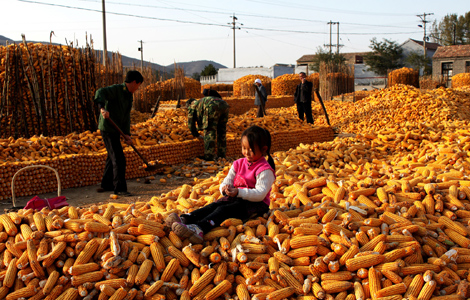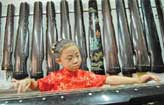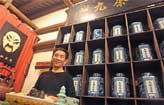Economy
Sowing the seeds of doubt
Updated: 2011-08-03 11:10
By Zhou Siyu (China Daily)
|
 |
|
Farmers harvest corn in Xiyang, Shanxi province. In recent years, Shanxi has boasted the largest sales of Pioneer's corn seeds in China. |
Zhang Yingquan always keeps his shop neat and tidy to allow as many people as possible to congregate there. Half a dozen blue plastic stools, accompanied by a large green thermo-jug, form a convenient resting area at the far end of the counter. Every spring, a bevy of villagers used to sit there exchanging country gossip for entire afternoons at a time. This year, however, the shop has been empty and quiet.
Zhang is a 32-year-old farmer in Shitie county, Shanxi province, the heartland of China. Along with his wife, he runs a franchised seed shop for Pioneer Hi-Bred International Inc, a subsidiary of DuPont de Nemours & Co. "Sales this year are little more than half those of last year," Zhang said bitterly.
In recent years, Shanxi has boasted the largest sales of Pioneer's corn seeds in China, but in Shitie and neighboring Dongzhao counties things are different. Zhao Zhicheng, one of the company's distributors who works in Dongzhao, a 45-minute drive from Zhang's shop, said he has experienced the same problem, but on a larger scale. What has dampened their sales is the large volume of counterfeit seeds (produced by another company, but marketed as those of one of the majors) in the market. "I have never seen so many fake seeds before," Zhao said.
"This year, the market has seen more counterfeit seeds than in the past," said Wei Yuejin, director of the local seed-control office, which is affiliated with the provincial agricultural bureaus and established at all government levels. Together they regulate the seed market, oversee quality and provide farmers with technical support.
The flood of fake seeds is by no means a local problem. An estimated 8,700 seed companies are operating in the Chinese market, but fewer than 100 have their own intellectual property rights. More than 90 percent of the companies are small and medium-sized enterprises (SMEs) and have lower levels of research and technology. Around 30 percent of them are engaged in producing and selling counterfeit seeds every year, according to industry reports.
China's vast seed market has long been in need of greater regulation, and there's every sign that the government will push for consolidation in the industry to improve the situation. In October 2010, the Ministry of Agriculture raised the registration threshold for seed-producing SMEs in a draft revision of the present regulations. Once the new rules take effect, "no more than 200 companies will meet the new requirements and stay in the market", Xia Jingyuan, director of the National Agro-Technical Extension and Service Center affiliated with the ministry, told Chinese media.

Specials

Carrier set for maiden voyage
China is refitting an obsolete aircraft carrier bought from Ukraine for research and training purposes.
 Photo
Photo  Video
Video

Pulling heart strings
The 5,000-year-old guqin holds a special place for both european and Chinese music lovers

Fit to a tea
Sixth-generation member of tea family brews up new ideas to modernize a time-honored business